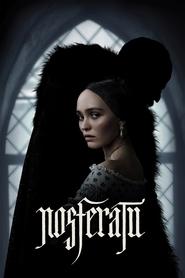It's always the goddamn estate agents. More seriously, a mixture of abstraction, opacity and austere formalism protects Eggers from the charge that he is dishonouring the legacy of F. W. Murnau's silent classic. But the result is something a little too lifeless, ironically.
(Is that the sanitorium they used in Amadeus…?)
Murnau’s Nosferatu was a low-budget effort, which, unusually for the time, was shot largely on location in order to save money. Despite the lurid extravagance of its visual artistry, the film is remarkably spare and brisk, conveying vast hauntings with simple but startling special effects. Though its action is depicted crisply and clearly, its epigrammatic shots aim straight for the viewer’s unconscious, making only glancing contact with the rational mind. For all Eggers’s dramatization of unreason, his images sit heavily onscreen awaiting something more significant than mere admiration—interpretation. This tone is one that he shares with such prominent modern auteurs as Christopher Nolan and Ari Aster: a trend of academicism, of embodying their intentions in compositions that seem made to be viewed with the close-reading methods of a cinema-studies major.
— Richard Brody (The New Yorker)
Eggers himself has been accused of a kind of bloodless formalism, with tightly coordinated camera moves, eye-poppingly meticulous production design, and dead-center compositions – a Wes Anderson of the macabre and the unknowable, perhaps? As with Anderson, this characterization may be technically accurate without precisely conveying the experience of watching the films at hand.
— Jesse Hassenger (Paste Magazine)
Any adaptation of Nosferatu has to decide on what can only be called the Mel Brooks question: how far to lean in to the black comic horror and absurdity. Herzog did it marginally, and so does Eggers – surely – by giving Dafoe’s professor a bizarrely long pipe to smoke (the equivalent, perhaps, of Klaus Kinski’s unsettlingly tall wineglass in Herzog’s Nosferatu).[…]
Stoker’s Count Dracula was a distant cousin to literary figures such as Mr Rochester and Maxim de Winter. Orlok [here] is more abstractly brutish, and has to be so from the very beginning, but I feel that Eggers’s vampire is more stylised, more studied, but less insidiously frightening than he needs to be,
— Peter Bradshaw (The Guardian)
Watching Nosferatu, I wished I hadn’t seen so many other versions of this story. I wished that I could put those experiences in a box and store them somewhere else, allowing myself to be confronted by this tale for the first time. Perhaps the film would have lasted longer in my mind; instead, it proved to have little staying power. [I] will remain envious of viewers whose first Nosferatu or Dracula experience is with this film.
— Brian Eggert (Brian Eggert)
What makes Eggers’s treatment of a centuries-old story interesting is the way it leverages archetype against innovation, drawing energy from ideas and iconography that already felt ancient the first time around. That familiarity is also what makes it a mostly draining viewing experience, the opposite of a shot in the arm. The mix of hubris and humility that leads Eggers to directly quote shots and sequences from F.W. Murnau serves as a powerful launching pad, albeit one that leads toward a dead end. In many ways, Nosfera-2.0 is richly conceived and executed, but there’s a nagging feeling of nothingness at its center. In the absence of any genuinely radical revisionism or consistent heart-in-throat scares, what is Eggers’s movie accomplishing besides being accomplished?[…]
Nosferatu is gorgeous yet inert, the cinematic equivalent of an exquisite corpse: There’s no point in driving a stake through a heart that isn’t beating in the first place.
— Adam Nayman (The Ringer)

